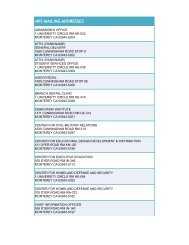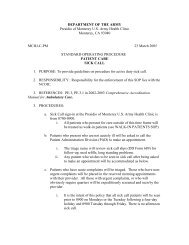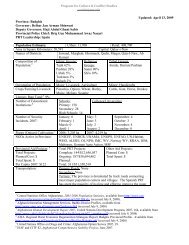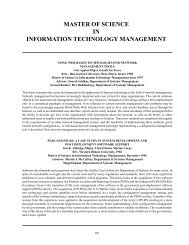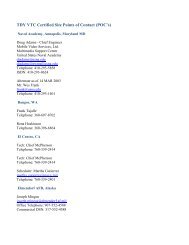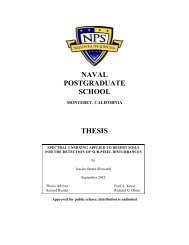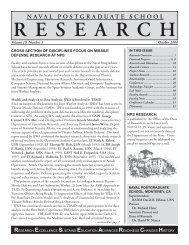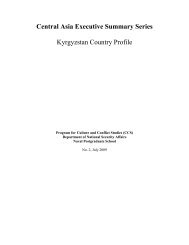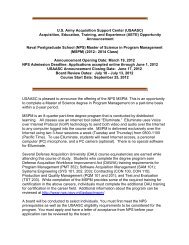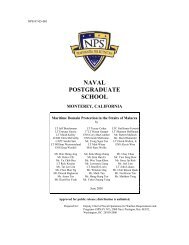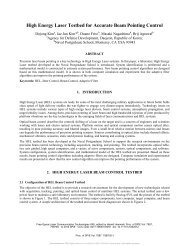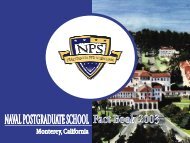GCSC Newsletter - July 2009 - Naval Postgraduate School
GCSC Newsletter - July 2009 - Naval Postgraduate School
GCSC Newsletter - July 2009 - Naval Postgraduate School
You also want an ePaper? Increase the reach of your titles
YUMPU automatically turns print PDFs into web optimized ePapers that Google loves.
Consortium Members:<br />
• Regional Centers for Strategic Studies<br />
• <strong>Naval</strong> <strong>Postgraduate</strong> <strong>School</strong><br />
• Center for Civil-Military Relations<br />
• Defense Resources Management<br />
Institute<br />
• Defense Language Institute English<br />
Language Center<br />
• Defense Institute of International Legal<br />
Studies<br />
• Defense Institute for Medical<br />
Operations<br />
• Joint Special Operations University<br />
• Defense Language Institute Foreign<br />
Language Center<br />
• Defense Institute of Security Assistance<br />
Management<br />
• COE in Disaster Management and<br />
Humanitarian Assistance<br />
• USMC Training and Education Command<br />
• Inter-American Air Forces Academy<br />
• <strong>Naval</strong> Small Craft Instruction and<br />
Technical Training <strong>School</strong><br />
• Western Hemisphere Institute for<br />
Security Cooperation<br />
• US Army Medical Department Center and<br />
<strong>School</strong><br />
A Note from <strong>GCSC</strong>’s Director<br />
Greetings from the Global Center. Highlights of the last six months are an aggressive expansion of our Consortium<br />
and rapid implementation of the Defense Institution Reform Initiative (DIRI).<br />
We have conducted extensive research and visited many DoD institutions to appropriately decide on the ones that<br />
would be of greatest value added to the Consortium. Therefore, we are delighted to welcome eight new members<br />
to be part of our strong team of international education providers. Our new members offer key areas of<br />
specializations that will bring significant benefits to the entire Consortium. We hope that our new members will<br />
make use of our products provided by the Global Center and will develop productive relationships with existing<br />
members.<br />
We have moved quickly to execute a DIRI pilot program in Colombia. We have coordinated with all interested agencies, hired staff, built a<br />
survey team, and planned and carried out the site visit. We are prepared and look forward to supporting this important initiative in the<br />
coming years.<br />
We have strengthened our common operating picture (COP) to cover over 860 events in 119 nations (62% of the world’s countries) and a<br />
database of over 200 subject matter experts. You can obtain access to the COP through our Regional International Outreach (RIO) site.<br />
Please enjoy this edition of the newsletter. We look forward to hearing from you. We especially welcome suggestions on how we can improve<br />
our support.<br />
Bob Ord,<br />
Director<br />
GLOBAL OUTREACH<br />
Global Center for Security Cooperation (<strong>GCSC</strong>)<br />
<strong>July</strong> <strong>2009</strong> Volume 1, Issue 2<br />
Global Center Continues to Grow<br />
New Consortium Members, Customers, Missions<br />
The Global Center for Security Cooperation, and the Global Center<br />
Consortium it manages, both continue to grow. Through participation<br />
in various high level conferences, the Center has identified several<br />
Department of Defense (DoD) institutions heavily involved in<br />
international partner education and is taking steps to include them in<br />
the Consortium. The Center has also reached out to a broader<br />
customer base, making its diverse range of products and services<br />
available beyond the Office of Secretary of Defense (OSD), Defense<br />
Security Cooperation Agency (DSCA), and Consortium members. The<br />
Global Center gained a significant new mission when OSD designated<br />
<strong>GCSC</strong> to lead the Defense Institutional Reform Initiative (DIRI) pilot<br />
program for FY09, which is designed to build partner countries’<br />
institutions.<br />
Global Center representatives attended several high-level<br />
conferences of international education providers, including events<br />
sponsored by NATO, EUCOM, CENTCOM, and SOUTHCOM, at which<br />
they met with the schools to discuss ways to integrate and coordinate<br />
their efforts with those of other providers. As a result, several<br />
schools expressed interest in joining the Global Center Consortium.<br />
(more on page 2)<br />
Inside this issue:<br />
<strong>GCSC</strong> Continues to Grow 2<br />
Benefits of Membership 2<br />
Making an Impact 3<br />
New Member Highlights 4-5<br />
Regional Center Spotlight 6-8<br />
Common Operating Picture 8<br />
In the Spotlight 9-15<br />
Transitions 16<br />
Facts and Figures 16<br />
Consortium Member Links 17<br />
Chamnan Lim<br />
Editor in Chief<br />
To obtain access to <strong>GCSC</strong> RIO,<br />
please contact: Ms. Chamnan<br />
Lim at : calim@nps.edu
Page 2 Global Outreach<br />
Global Center Continues to Grow (cont’d)<br />
The Inter-American Air Forces Academy, US Army Medical Department Center and<br />
<strong>School</strong>, USMC Training and Education Command, Defense Institute of Security<br />
Assistance Management, Joint Special Operations University, Defense Language<br />
Institute Foreign Language Center, the Center for Excellence in Disaster<br />
Management and Humanitarian Affairs, the <strong>Naval</strong> Small Craft Instruction and<br />
Technical Training <strong>School</strong>, and the Western Hemisphere Institute for Security<br />
Cooperation, have all expressed interest and joined the Consortium since the<br />
beginning of <strong>2009</strong>. Several other institutions are currently considering<br />
membership, including the National Defense University, Air University, Army and<br />
<strong>Naval</strong> War Colleges, and the Army’s Combined Arms Center. With a variety of<br />
members joining the Consortium, the group offers an ever broader resource for<br />
education providers, policymakers and course developers working in<br />
international education.<br />
These institutions provided information on their international programs to be<br />
included in Global Center consolidated products. The Subject Matter Expert<br />
database grew by 50% as new specialists were identified and course descriptions<br />
for several recurring events were added to the Global Center web portal in RIO.<br />
The consolidated calendar of events now includes over 860 events in 119<br />
countries worldwide. Global Center products continue to offer better and better<br />
sources of information regarding international education.<br />
As the Global Center’s products improve, the customer base using them<br />
continues to grow. New customers range from the inter-agency (State<br />
Department) and international (NATO headquarters) levels to tactical units (95th<br />
Civil Affairs Brigade) and Security Cooperation Officers at embassies around the<br />
world. Such a broad base means Consortium members’ programs gain visibility<br />
across a wide variety of policymakers and program executers. In fact, the Global<br />
Center’s RIO site has recorded nearly 200,000 hits this year.<br />
“We must build up our special operations forces, civil<br />
affairs, information operations, and other units and<br />
capabilities that remain in chronic short supply; invest<br />
in foreign language training, cultural awareness, and<br />
human intelligence and other needed counterinsurgency<br />
and stabilization skill sets; and create a more<br />
robust capacity to train, equip, and advise<br />
foreign security forces, so that local allies<br />
are better prepared to confront mutual<br />
threats.”<br />
President Barack Obama<br />
(from the White House<br />
website)<br />
VISION<br />
• A consortium to provide leadership to international<br />
educational institutions.<br />
• A supporting relationship with each Regional<br />
Center for Strategic Studies (RCSS)<br />
• Added capacity to the RCSS’s by integrating<br />
other international education providers into the<br />
<strong>GCSC</strong>.<br />
MISSION<br />
Manage a requirements-based system to<br />
coordinate, integrate and deconflict international<br />
providers’ activities and capabilities, consistent<br />
with OSD priorities, in support of the 2006 QDR,<br />
GEF, and the Combatant Commanders’ TSCPs.<br />
ARE YOU TAKING ADVANTAGE OF ALL THE<br />
BENEFITS OF CONSORTIUM MEMBERSHIP?<br />
Global Center Consortium membership brings several<br />
benefits. If you’re not taking advantage of everything<br />
listed below, contact the Global Center staff and find<br />
out how to get the most out of your membership!<br />
• Access to Common Operating Picture via RIO<br />
web portal<br />
• Vast information consolidated for ready<br />
reference<br />
• Means of communication with other providers<br />
• Visibility for member institutions’ programs<br />
before a wide customer base<br />
• Prestige and linkages with nationally<br />
recognized educational institutions<br />
• Access to supporting capabilities and<br />
resources<br />
• Access to educational and subject matter<br />
experts<br />
• Access to archives of After-Action Reports and<br />
Lessons Learned<br />
• Access to training and education events<br />
conducted by Consortium members
Volume 1, Issue 2<br />
Global Center making an impact<br />
Defense Institution Reform Initiative (DIRI)<br />
In January of <strong>2009</strong>, DSCA tasked the <strong>GCSC</strong> with implementing the pilot project of DIRI, a new security cooperation program intended to help<br />
partner countries develop accountable, professional, and transparent defense establishments that can manage, sustain, and employ their<br />
forces and the capabilities developed through U.S. security cooperation programs. DIRI will support broad USG security sector reform<br />
objectives and whole-of-government approaches. The Office of the Assistant Secretary of Defense for Partnership Strategy and Stability<br />
Operations is responsible for DIRI policy oversight.<br />
Leveraging Title 10 authorities, DIRI seeks to strengthen ministerial to ministerial relationships and build ministerial capacity as a<br />
complement to existing military to military relationships. The DIRI process consists of four distinct phases:<br />
Phase One: Requirements Determination: Subject Matter Experts—with OSD, Combatant Command, and country team support— work<br />
together with partner nation personnel to determine defense institution capacity in areas identified by the partner nation as priorities.<br />
Phase Two: Program Development: In consultation with partner nation personnel, DIRI regional and functional SMEs develop a roadmap<br />
with intermediate objectives and a series of phased activities to address capability or capacity gaps identified in the survey.<br />
Phase Three: Program Implementation and Execution: Sequential, country-specific activities for each roadmap block are executed. Activity<br />
providers work with partner nation personnel in a step-by-step process to implement the roadmap.<br />
Phase Four: Program Assessment: Every 12-18 months, DIRI surveys / roadmaps are re-assessed and updated.<br />
DIRI focus areas are Defense Policy & Strategy; Human Resource Development (including Professional Defense & Military Education);<br />
Defense Planning, Budgeting and Resource Management; Logistics & Infrastructure; and Civil-Military Relations and Interagency<br />
Coordination.<br />
The Global Center initiated the FY <strong>2009</strong> pilot project in Colombia with a visit to Bogota from April 13-17, <strong>2009</strong>, to discuss key issues in the<br />
two focus areas desired by the Colombian MOD: Professional Defense and Military Education and Defense Planning, Budgeting, and<br />
Resource Management. The DIRI team benefited from the participation of key members from the Center for Hemispheric Defense Studies,<br />
the <strong>Naval</strong> <strong>Postgraduate</strong> <strong>School</strong>, the Center for Civil-Military Relations, and the Defense Resource Management Study Program (OSD/PA&E).<br />
In the remainder of the FY, the DIRI team is working to finalize the roadmap and implement agreed-upon activities.<br />
EUCOM LNO: Global Supply Chain Management – Security Challenges and Solutions<br />
The Global Center for Security Cooperation’s Liaison Officer to EUCOM, Ms. Kathleen Peggar, has been posted to Stuttgart at EUCOM<br />
Headquarters since June 2008. Her mission includes enhancing communications and providing ongoing situational awareness for the<br />
<strong>Naval</strong> <strong>Postgraduate</strong> <strong>School</strong> / <strong>School</strong> of International Graduate Studies, <strong>GCSC</strong>, and EUCOM.<br />
Page 3<br />
Since her arrival in Stuttgart, she has begun a number of initiatives to advance the interests of both EUCOM, NPS, and the Global Center and<br />
its members and partners. Among other projects, she developed an international symposium entitled “Global Supply Chain Management –<br />
Security Challenges and Solutions.” This event, developed in support of EUCOM’s Strategy of Active Security (SAS), focused on building<br />
international partner capacity and strengthening ties between EUCOM and its many partners and stakeholders in civilian government<br />
agencies and the military, international organizations, academia and the private sector.<br />
The symposium, held 2-5 February <strong>2009</strong> in Munich, was a very successful partnership between EUCOM, the U.S. <strong>Naval</strong> <strong>Postgraduate</strong> <strong>School</strong><br />
and the Universität der Bundeswehr München. Military and civilian attendees from more than a dozen countries attended this symposium,<br />
which was hosted by EUCOM’s Deputy<br />
Commander, Vice Admiral Richard Gallagher,<br />
and closed by the EUCOM Chief of Staff,<br />
Major General Ken Keen.<br />
Major General Ken Keen<br />
EUCOM Chief of Staff
Page 4 Global Outreach<br />
New Consortium Member Highlights<br />
We are pleased to have new members joining the Consortium. Our new members represent many areas of expertise from<br />
security management and foreign languages to medical and technical training. We hope that the growth of the<br />
Consortium will strengthen the capabilities for collaboration and provide added visibility of what is being offered in<br />
international military education.<br />
COE in Disaster Management and<br />
Humanitarian Assistance<br />
Vision: Asia-Pacific Region prepared to respond to,<br />
collaborate, and manage natural and man-made disasters.<br />
Asia-Pacific nations with disaster management plans,<br />
prepared to respond to plausible contingencies, and willing to<br />
participate in a regional collaborative framework.<br />
Mission: Educate, train, conduct research and assist in<br />
international disaster preparedness, disaster mitigation,<br />
disaster management, disaster response, health security,<br />
humanitarian assistance and social resilience.<br />
Inter-American Air Forces Academy<br />
IAAFA was founded on 15 Mar 1943, at the request of Peru’s<br />
Minister of Aeronautics and became the first US aeronautics<br />
training center in Latin America. The academy emphasizes<br />
hands-on instruction for officers, non-commissioned officers,<br />
and enlisted personnel, and provides military and athletic<br />
training and US cultural awareness for all students. IAAFA<br />
graduates an average of 800 students a year.<br />
Vision: Airpower's gateway to the Americas...Training for<br />
today...Building partnerships for tomorrow<br />
Mission: Fostering enduring Inter-American engagement<br />
through mil-to-mil contact, education, and training<br />
Defense Language Institute Foreign<br />
Language Center<br />
Vision: The acknowledged leader in all aspects of culturallybased<br />
foreign language education, DLIFLC is an innovative<br />
and continuously adapting organization, operating on the<br />
cutting edge of language instruction and technology.<br />
Mission: DLIFLC provides culturally-based foreign language<br />
education, training, evaluation, and sustainment for DoD<br />
personnel in order to ensure the success of the Defense<br />
Language Program and enhance the security of the nation.<br />
USMC Training and Education Command<br />
Mission: Develop, coordinate, resource, execute, and<br />
evaluate training and education concepts, policies, plans, and<br />
programs to ensure Marines are prepared to meet the<br />
challenges of present and future operational environments.<br />
Within TECOM, the Global Center works closely with the<br />
Center for Advanced Operational Culture Learning (CAOCL)<br />
and Security Cooperation Education and Training Center<br />
(SCETC).<br />
CAOCL is the central Marine Corps agency for operational<br />
culture that provides regional, operational culture and<br />
language knowledge through training and education, in order<br />
to plan and operate in the joint expeditionary environment.<br />
SCETC is responsible for implementing and evaluating<br />
Marine Corps Security Cooperation education and training<br />
programs in order to support Marine Component Commands’<br />
efforts to build partner capacity.
Volume 1, Issue 2<br />
New Consortium Member Highlights (cont’d)<br />
<strong>Naval</strong> Small Craft Instruction and<br />
Technical Training <strong>School</strong><br />
Established in <strong>July</strong> 1983, the school offers ten formal courses<br />
of instruction in both Spanish and English at various times<br />
throughout the year while deploying Mobile Training Teams<br />
around the globe. NAVSCIATTS has trained more than six<br />
thousand students from over 55 partner nations.<br />
Mission: NAVSCIATTS conducts Foreign Internal Defense<br />
(FID) in support of Combatant Commanders in accordance<br />
with Commander, U.S. Special Operations Command<br />
priorities using Mobile Training Teams (MTTS) and inresidence<br />
training to prepare partner nation forces to conduct<br />
small craft operations in riverine or littoral environments.<br />
The Western Hemisphere Institute for<br />
Security Cooperation<br />
Established on 30 October 2000 to provide professional<br />
education and training to eligible persons of the nations of the<br />
Western Hemisphere within the context of the democratic<br />
principles set forth in the Charter of the Organization of<br />
American States.<br />
Mission: Fostering mutual knowledge, transparency,<br />
confidence, and cooperation by promoting democratic values;<br />
respect for human rights; and an understanding of U.S.<br />
customs and traditions. Specific subjects set by Congress<br />
include leadership development; counterdrug; peacekeeping;<br />
resource management; and disaster relief planning. Ten<br />
percent of the content of every course is devoted to<br />
democracy, ethics, and human rights training.<br />
U.S. Army Medical Department Center<br />
and <strong>School</strong><br />
Vision: To be the foundation on which the Army Medical<br />
Department is built, sustained and transformed<br />
Defense Institute of Security Assistance<br />
Management<br />
Page 5<br />
Mission: We envision, design and train a premier military<br />
medical force for full spectrum operations in support of our<br />
Nation.<br />
Strategic Themes:<br />
• Excellence in Products and Services<br />
• Realizing Employee Potential<br />
• Embrace Change Management<br />
• Operational Excellence<br />
DISAM was established in September 1976 to provide<br />
education, research, and consultation services to security<br />
assistance managers. The Institute is chartered as the single<br />
Department of Defense educational activity advancing an<br />
understanding of the complex laws, policies, and procedures<br />
associated with managing security cooperation programs.<br />
To accomplish this mission, DISAM:<br />
• Teaches resident and nonresident formal courses<br />
• Presents seminars and tutorials in security cooperation<br />
management<br />
• Conducts research and special studies, and provides<br />
consultation in security cooperation management<br />
• Disseminates information to the security assistance<br />
community; and develops and manages computer<br />
automation systems for worldwide security assistance<br />
activities.
Page 6 Global Outreach<br />
Regional Centers Spotlight (news and updates)<br />
Africa Center for Strategic Studies Celebrating Its 10th Anniversary<br />
A decade of achievement through academic excellence and community outreach<br />
The Africa Center for Strategic Studies is commemorating its 10th Anniversary this year. The Africa Center has provided for 10 years an<br />
academic forum for informed dialogue. Scholastic symposia and outreach events with the diplomatic community in Washington and in<br />
Africa are slated throughout the year to celebrate the Africa Center’s historic achievement.<br />
The Department of Defense established the Africa Center in 1999 as one of its five regional centers to provide strategic-level education to<br />
international civilian and military personnel through a combination of multi-week courses, short-term conferences, seminars and workshops,<br />
and outreach.<br />
Recalling the Africa Center’s history, Ambassador William M. Bellamy said: “Our first program was a Senior Leadership Seminar held in<br />
Dakar in October 1999. Since then, more than 3,400 participants from across Africa and around the world have attended Africa Center<br />
programs. Participants have included high-level civilian government officials, military officers, parliamentarians, academics, and regional,<br />
non-governmental, and international leaders.”<br />
“We’re proud of our accomplishments over the past 10 years and look forward to meeting the challenges of the next decade by building<br />
upon our past,” Ambassador Bellamy said. “We’ll strengthen our relationship with U.S. Africa Command as we continue to recognize<br />
opportunities for mutual cooperation and support with the new combatant command.”<br />
Ambassador (retired) William M. Bellamy, Director of the Africa Center,<br />
presents General William E. “Kip” Ward, Commander of the U.S. Africa<br />
Command, with one of the Center’s newly-minted 10th Anniversary coins.<br />
APCSS: Workshop Focuses on UN Peacekeeping Options, Challenges<br />
An Asia-Pacific Center for Security Studies (APCSS) team led by Director retired Army Lt. Gen. Ed Smith completed a workshop entitled<br />
“Vietnam and United Nations Peace Operations” at the Diplomatic Academy of Vietnam (DAV) in Hanoi.<br />
The focus of the five-day workshop was to examine the issues and challenges that countries face in conducting peacekeeping operations<br />
(PKO). Co-hosted by the DAV, nearly 50 mid-level and senior policy leaders from the Vietnamese Ministry of Defense, Ministry of Public<br />
Safety and Ministry of Foreign Affairs, who are involved in peace operations actively participated in the workshop.<br />
“This workshop has helped me explore different aspects of UN peace operations, and gain in-depth knowledge of their challenges and<br />
opportunities,” said one Vietnamese workshop participant. “The practical experiences shared by the speakers have reminded me to adopt a<br />
more objective view of the effectiveness of UN PKO.”<br />
A final goal of the workshop was to formulate how working with the UN will affect Vietnamese<br />
participation in peace operations. Near the end of the workshop, the two subgroups nominated<br />
representatives to deliver their presentations. The intent of the reports were to be recommended<br />
next steps for Vietnam’s participation in UN peacekeeping operations may be presented in due<br />
course to the Government of Vietnam.<br />
Participants outside the Diplomatic Academy of Vietnam
Volume 1, Issue 2<br />
Regional Centers Spotlight (news and updates)<br />
CHDS, Barely Unpacked at New NDU Home, Increases Pace of Cutting-edge Educational Outreach<br />
Page 7<br />
The Center for Hemispheric Defense Studies (CHDS) had no sooner moved to its new home at the recently-built Lincoln Hall at the National<br />
Defense University (NDU) when its faculty and staff were out the gate with an increased offering of innovative academic outreach programs<br />
both in Washington, D.C. and throughout Latin America and the Caribbean.<br />
For example, on January 12-14, CHDS teamed with the Asia Pacific Center for Security Studies (APCSS), the Freeman Spogli Institute for<br />
International Studies (FSI) at Stanford University, and the Pacific Council on International Policy (PCIP), to co-host a conference on “Pacific<br />
Rim Security – Managing the Global Commons” at Stanford in Palo Alto, California. The event brought together 45 delegates from 17<br />
nations. The conference provided a unique venue for senior government and non-governmental civilian and military leaders, security<br />
practitioners, and security studies experts from the Pacific Rim region to gain insights on the confluence of transnational security concerns<br />
linking Asia and Americas.<br />
The event was one of several major undertakings by the Center in the first trimester of <strong>2009</strong>. On April 2, CHDS played host to its second<br />
"Face-to-Face Encounter" in <strong>2009</strong>, this time focusing on the theme "A New U.S. Administration, A New Hemisphere? Perspectives from Three<br />
Continents."<br />
And from April 6 to May 1, <strong>2009</strong>, CHDS gathered 33 scholars and practitioners from seven Latin American nations in the course<br />
Perspectives on Homeland Security and Homeland Defense. Using online and in-residence methodologies, participants ranging from<br />
civilians from the executive, legislative and judicial branches to educators, academic researchers, and journalists, were able to analyze and<br />
compare different approaches to face terrorism and natural disasters.<br />
Another of the most notable events in early <strong>2009</strong> was the visit by President Barack Obama to NDU on March 12, where he paid tribute to<br />
Abraham Lincoln, for whom the Center for Hemispheric Defense Studies’ new home is named, and to honor the military education and<br />
training activities of all of the NDU’s component institutions and centers. The 44th president noted that NDU was the place where students<br />
came together "to think, to learn and to seek new strategies to defend our union, while pursuing the goal<br />
of a just and lasting peace."<br />
NESA Center Experiences Rapid Growth<br />
Former Peruvian President Alejandro Toledo, shown here with<br />
CHDS Deputy Director Ken LaPlante, was one of a dozen distinguished<br />
visitors from the Western Hemisphere at its "Pacific Rim Security - Managing the Global Commons" conference.<br />
The Near East South Asia Center (NESA) for Strategic Studies has rapidly expanded since its beginning in October 2000.<br />
With just under 2,000 graduates of its core seminars, the Center is aggressively pursuing its mission to enhance security in the critical NESA<br />
region by building sustained, mutually beneficial relationships; fostering regional cooperation on security issues and promoting effective<br />
communications and strategic capacity through candid interaction in an academic environment.<br />
In FY<strong>2009</strong> NESA will host a growing number of seminars and workshops in Washington and in the NESA region. In December 2008 alone,<br />
the Center hosted two core courses, an executive seminar and a Combating Terrorism seminar for senior executives, a luncheon for defense<br />
attachés from a dozen embassies. This year, the Center is holding several seminars dedicated to combating terrorism.<br />
The monthly Washington Seminars have become increasingly popular, with dozens of embassy and distinguished panelists having<br />
discussions on subjects of current interest.<br />
Plans for an in-region office have been approved in principle, and NESA anticipates opening for business<br />
by fall <strong>2009</strong>. Plans also are underway for NESA’s annual alumni symposium in the region. More than<br />
100 participants, USG officials, alumni and local officials are expected to participate. Smaller alumni<br />
events are occurring more frequently as NESA staff and faculty visit the region.<br />
Executive seminar participants pose with NESA staff in front of the<br />
Army War College at Carlisle, Pennsylvania
Page 8 Global Outreach<br />
Regional Centers Spotlight (news and updates)<br />
GCMC Students Visit Africa Command<br />
During a visit to the U.S. Africa Command headquarters in Stuttgart, Germany on May 28, <strong>2009</strong>, a group of six African graduate students<br />
learned about the command's mission, met with senior leaders, and engaged in discussions focusing on regional issues. The students were<br />
in Germany as part of a 12-week academic program offered through the Marshall Center, a German-American security and defense<br />
educational institution. The Program in Advanced Security Studies (PASS) provides civilian government officials, military officers, and<br />
government academics with graduate-level study in security policy, defense affairs, international relations, and related topics.<br />
Taking a day away from their regular courses, the students took advantage of an opportunity to tour the U.S. Africa Command headquarters.<br />
Among the highlights of their visit was the chance to engage with U.S. Africa Command desk officers, who provided the students with a<br />
tailored orientation of the command's initiatives in each of their respective countries. The day concluded with remarks from the command's<br />
Chief of Staff Major General Snodgrass and other senior command staff. Marshall Center's PASS includes seminar discussions, debates,<br />
panels, role-playing exercises, and field study, allowing participants to examine national and international security institutions and speak<br />
with senior decision-makers.<br />
.<br />
Policy<br />
Auth/Dir/Con of RC’s<br />
Students met with U.S. Africa<br />
Command senior leaders and engaged in discussions<br />
focusing on regional issues.<br />
<strong>GCSC</strong> Providing a Common Operating Picture<br />
Administrative Authority<br />
Added Capacity<br />
One-stop<br />
Shopping<br />
Coordination<br />
Guidance<br />
DLIELC<br />
Deconfliction<br />
RIO<br />
Harmonization<br />
Integration<br />
DLIFLC<br />
CAPABILITIES:<br />
Educational & subject matter expertise<br />
Faculty sharing<br />
METs<br />
In-residence courses<br />
Distance Learning<br />
Program & curricula synchronization<br />
Faculty & student research<br />
Graduate & executive level education
Volume 1, Issue 2<br />
In the Spotlight<br />
News and Updates<br />
Center for Excellence in Disaster Management and Humanitarian Assistance (COE-DMHA)<br />
U.S. Military, United Nations in Landmark Pandemic Influenza Event<br />
ROME, Italy (May 18 to 22) - A landmark senior-level pandemic influenza conference was attended by health and military professionals from<br />
nine Asia-Pacific and 13 African countries.<br />
Approximately 90 senior-level civilian and military participants attended, including Ministries of Health officials or representatives from<br />
Bangladesh, Indonesia, Cambodia, India, Malaysia, Mongolia, Nepal and Vietnam.<br />
The conference was co-hosted by U.S. Pacific Command’s (USPACOM) Center for Excellence in Disaster Management and Humanitarian<br />
Assistance (COE) and the U.S. military’s Africa Command (USAFRICOM), with the support of the U.S. Agency for International Development<br />
(USAID) and the United Nations World Food Programme (WFP).<br />
The Rome workshop aimed to identify important gaps in international pandemic response protocols, ensure effective integration of civilmilitary<br />
plans, and create opportunities to develop relationships among civilian and military agencies.<br />
Page 9<br />
Since 2007, COE has held 11 pandemic influenza planning workshops in Bangladesh, Malaysia, Singapore and Thailand on behalf of<br />
USPACOM. These events have involved the participation of foreign militaries, national ministries of health, UN agencies, and the U.S. Centers<br />
for Disease Control (CDC).<br />
DISAM – “Getting the Word Out”<br />
One of the missions of the Defense Institute of Security Assistance Management (DISAM) is information dissemination. To that end the Institute<br />
maintains their website (www.disam.dsca.mil), publishes numerous textbooks and training materials, and publishes The DISAM Journal.<br />
The Objectives of the DISAM Journal are to provide the International security assistance/security cooperation community<br />
a quarterly journal of information that is topical, and as broad and varied as the audience. That is, articles<br />
will encompass all aspects of security cooperation and assistance, as well as related topics considered international<br />
in nature.<br />
The DISAM Journal is published in quarterly editions throughout the calendar year and is available in hard copy on<br />
a no fee basis to USG organizations within CONUS and overseas. It is also available for a subscription fee to U.S.<br />
and international industry as well as International purchasers. www.disam.dsca.mil/pubs/yearjournal.asp<br />
Approximately 8500 printed editions are distributed each year through the U.S. and abroad. Another approximately<br />
9000 visits are made to the on-line editions via the DISAM website every year.<br />
Those interested in submitting an article for publication, or in having their organization “featured” can obtain more<br />
detailed information at the DISAM website: http://www.disam.dsca.mil/pubs/clncrqst.pdf<br />
or by contacting DISAM/DR at (937) 255-2994, DSN 785-2994.
Page 10 Global Outreach<br />
In the Spotlight<br />
News and Updates<br />
Peacekeeping Focus for Defense Institute of International Legal Studies (DIILS) Program in Nepal<br />
Nepal, a leading contributor to United Nations peacekeeping operations throughout the world, recently participated in a DIILS-led program<br />
focused on improving the understanding of challenges faced in peacekeeping for key members of its forces.<br />
Thirty leaders of the Nepal Military, Police and Armed Police who are likely to participate in UN Peacekeeping missions participated in the<br />
recent Legal Aspects of Peacekeeping Operations program presented by DIILS in Kathmandu, Nepal.<br />
The DIILS team included adjunct faculty members from the U.S. Institute of Peace, the U.S. Air Force, and the U.S. Navy, and had DIILS staff<br />
members from the U.S. Marine Corps and the U.S. Army. The participants in the seminar made presentations which included observations<br />
and practical problem-solving arising from their experiences in Darfur.<br />
This program marked DIILS’ eighth program in Nepal, and represents the continued partnership with the country which began in 2004.<br />
Members of the Peacekeeping seminar in Nepal<br />
Defense Language Institute English Language Center (DLIELC) Field Studies Program<br />
The Field Studies Program (FSP) at DLIELC is an integral component of the Joint Security Assistance Training program, and the largest FSP<br />
sponsored by the Department of Defense. The primary objective of the FSP is to introduce DLIELC’s international students to the American<br />
way of life. The program provides the students with an awareness of international human rights and democratic principles. The goal is to<br />
ensure that DLIELC’s international students return to their homeland with an “understanding of the responsibility of government, military,<br />
and citizens to protect, preserve and respect the rights of every individual” as explained in The Universal Declaration of Human Rights.<br />
The FSP sponsors events which expose students to the democratic ideals of an elected government, effective civilian-military relations, a<br />
culturally, ethnically, economically and socially diverse population, and the United States’ free enterprise system. These events include<br />
academic and weekend tours in and around San Antonio. The tours ensure that free discussion and frank explanation of American ideals<br />
are presented in real-time situations. Additionally, the international students in the Instructor Development Branch, who will return home to<br />
teach the American Language Course, have an opportunity to tour Washington, D.C.<br />
DLIELC is proud of the role the FSP plays in introducing our international students to American<br />
ideals, and most importantly, to show how Americans from all nationalities and walks of life live,<br />
worship and work together.<br />
DLIELC international students are exposed to American history<br />
and the American spirit through a Field Studies Program tour of the Alamo.
Volume 1, Issue 2<br />
In the Spotlight<br />
News and Updates<br />
Defense Institute for Medical Operations (DIMO)<br />
Page 11<br />
The Defense Institute for Medical Operations (DIMO), located at Brooks City-Base, Texas hosted its annual Executive Healthcare Resource<br />
Management (EHRM) course from 13-24 April <strong>2009</strong>. The two-week course was held at the USAF <strong>School</strong> of Aerospace Medicine and was<br />
conducted with the following objectives: to assist foreign nations with resolution of military healthcare management challenges; to provide<br />
graduate level education to facilitate the development of military healthcare practices; and, to increase awareness of the impact of access,<br />
quality and cost-effective healthcare services on the force health protection of military and civilian personnel. The 22 subject matter experts<br />
(SMEs) that instructed the course were comprised of U.S. Navy and U.S. Air Force from Brooks City-Base, Fort Sam Houston, and Lackland<br />
Air Force Base, and civilian instructors from local universities.<br />
Outside the classroom, the participants visited the Audie L. Murphy Memorial Veterans Hospital, Wilford Hall Medical Center, Brooke Army<br />
Medical Center, University Hospital and the U.S. Air Force Expeditionary Medical Support (EMEDS) facility to view “best practices” in<br />
healthcare. The three participants from Armenia, Lebanon, and Sierra Leone experienced social, economic, and historic aspects of<br />
American and Texas culture through the Field Studies Program.<br />
DIMO continues to support the Combatant Commanders’ Theater Security Cooperation efforts through medical engagement with partner<br />
nations. Since the beginning of this fiscal year, DIMO’s teams of SMEs have trained over 400 foreign military and civilian personnel<br />
representing almost 50 countries. The vast majority of these training programs took place in the host<br />
nation and covered a diverse list of subjects ranging from disaster response and trauma systems<br />
management to aeromedical evacuation principles and preventive medicine for deploying forces.<br />
Inter-American Air Forces Academy (IAFFA)<br />
LCDR Tina Jangel, Director, Healthcare Policy/Management at DIMO<br />
is pictured with students from Armenia, Lebanon, and Sierra Leone<br />
who attended the Executive Healthcare Resource Management Course<br />
conducted by DIMO 13-24 April <strong>2009</strong><br />
Gateways to the Americas: Promoting Partnership through Education<br />
Amidst the roar of a C-5 Galaxy taking off from the flight line, guest instructor Jacob Garcia Hernandez is showing Mexican cadets the inner<br />
workings of the UH-1H Huey helicopter inside a hangar. Garcia, a Master Sergeant in the Colombian Air Force, has been at Lackland’s Inter-<br />
American Air Forces Academy for almost two years teaching three courses in helicopter maintenance and providing hands-on, on-the-job<br />
practical training to cadets.<br />
“I’m here to share the knowledge I’ve acquired in my country over the years and pass it on to the students, and hopefully bring back new<br />
ideas back to my country, especially in the progress of technology,” said Master Sgt. Garcia. He also explained how students receive a<br />
person-to-person education, as opposed to the typical teacher-student dynamic. And just because a student graduates, it doesn’t mean the<br />
end of the learning process.<br />
IAAFA’s courses, which range from two to 12 weeks, are far-reaching, and students who receive their golden wings upon graduation wear<br />
them with pride. Throughout South America, pilots who have passed through IAAFA’s instrument flight procedures training are considered<br />
some of the best and the brightest.<br />
Students who attend longer courses are also given the opportunity to attend the field studies program, which allows cadets to participate in<br />
cultural and educational events and visit local and state government institutions. The program gives<br />
students a balanced understanding of the United States culture, society, and way of life.<br />
“All the people who have come through IAAFA and the other U.S. service schools will have contacts<br />
here...and that’s what we ultimately want to do,” said Col. Maria Cordero, IAAFA Commandant. “We<br />
want to forge those partnerships that will enable us to continue to talk to each other as fellow military<br />
members no matter what happens with the politics.”<br />
It is precisely these types of partnerships that have been and continued to be cultivated at schools like<br />
IAAFA that have paved the way for regional cooperation and a different perspective on relationships.
Page 12 Global Outreach<br />
In the Spotlight<br />
News and Updates<br />
Defense Language Institute Foreign Language Center (DLIFLC)<br />
The Defense Language Institute Foreign Language Center recently graduated a group of Danish military students, from a 48-week long<br />
Pashto course. The students, who achieved outstanding scores, will work as cultural advisors and interpreters in Afghanistan.<br />
"We are extremely proud of our students and very grateful for your assistance in hosting and teaching them such an important language,"<br />
said Lt. Col. Steen Bornholdt Andersen, Commandant of the Institute of Foreign Languages of the Royal Danish Defence College in Denmark.<br />
The Royal Danish Defence College sent their officers to DLIFLC because of DLIFLC's robust Pashto program and highly qualified Afghan-born<br />
instructors. The Institute 's Foreign Area Officer Program helped organize and facilitate the Danes’ year-long stay in Monterey. The Danish<br />
students achieved 100 percent graduating scores, having reached or surpassed a 2 in reading, 2 in listening, and I+ in speaking, according<br />
to the Interagency Language Roundtable (ILR) scoring system.<br />
Fifty percent of the class obtained a full point higher in all three disciplines, one of the students received the Provost's award, another high<br />
honors, and a third honors.<br />
Joint Special Operations University (JSOU) Conducts<br />
Dean of the Multilanguage <strong>School</strong> Dr. Shensheng Zhu,<br />
gives a diploma to a graduating Pashto language Danish student.<br />
Special Operations Combating Terrorism (SOCbT) Course in United Arab Emirates<br />
The United Arab Emirates (UAE) was the venue this spring for the Joint Special Operations University (JSOU) Special Operations Combating<br />
Terrorism (SOCbT) Course. It was the first time that JSOU provided its full two-week course overseas. The regional SOCbT seminar, 19-30<br />
April, <strong>2009</strong>, was sponsored jointly by JSOU, SOCCENT, the US MILGP, the UAE Special Operations Command, and the Emirates Center for<br />
Strategic Studies and Research (ECSSR). A total of 29 students from the UAE, Morocco, Kuwait, Lebanon, Iraq, Jordan, Pakistan, and the<br />
U.S. participated in the course. After opening ceremonies hosted by the US Ambassador to the UAE, Richard Olsen, course director Tim<br />
Collins charted the way for the 27 blocks of instruction that followed.<br />
The JSOU course greatly benefited from the contributions of a number of distinguished lecturers who supported the SOCbT Course with a<br />
very high level of post-graduate education.<br />
A major part of the course involved a strategic level exercise. After participating in a strategy<br />
development seminar, the students were organized into multinational workgroups. Each group<br />
was presented with a difficult strategic problem and tasked to produce a strategy to address<br />
these challenges. The workgroups developed strategies to deny sanctuaries to armed groups,<br />
address the nexus of organized crime and terrorism, counter and deny support for extremist<br />
ideologies, and make use of both direct and indirect concepts in combating terrorism.<br />
The feedback regarding the UAE SOCbT JMET was overwhelmingly positive, a point that is<br />
particularly gratifying given the exceptional educational backgrounds and military experience<br />
levels of the majority of the participants. As a result of the success of the UAE SOCbT seminar,<br />
the JSOU is considering taking the course on the road again during FY10.
Volume 1, Issue 2<br />
In the Spotlight<br />
News and Updates<br />
Army Medical Department International Medical Training Program<br />
Page 13<br />
As a preeminent leader in medicine, from research and development through all echelons of healthcare delivery, the<br />
Army Medical Department (AMEDD) possesses the ability to mentor and assist our international colleagues and advance the practice of<br />
medicine. Over 70 AMEDD formal and specialized training courses are available to include: Officer, Enlisted, Professional Leadership<br />
Development and Pastoral Ministry in Medical Settings. Under the auspices of the Security Assistance Training Program, the AMEDD trains<br />
over 300 international students annually, representing more than 80 countries at Ft. Sam Houston, TX, major medical centers and research<br />
laboratories.<br />
In addition, the US Army Medical Department Center and <strong>School</strong> (AMEDDC&S) at Ft. Sam Houston conducts a robust international<br />
engagement program that includes hosting international visitors. During visits, AMEDDC&S personnel receive inquiries and provide<br />
information on various military and medical topics to include lessons-learned from OIF and OEF.<br />
Foreign delegation visits are extremely important to the international engagement process and the<br />
exchange of healthcare information fosters and strengthens our medical coalition in the Global War<br />
on Terrorism. Visits also generate subsequent subject matter expert exchanges and military-tomilitary<br />
contacts between nations. In 2008, the AMEDDC&S hosted numerous delegation visits from<br />
the following countries: Argentina, Brazil, Burundi, Chile, Jordan, Japan, Finland, Germany, Israel,<br />
Kyrgyzstan, Poland, Saudi Arabia, Sweden, Trinidad, and Uzbekistan. In addition, we hosted military<br />
attachés attending the Inter-American Defense College and medical personnel from 28 Latin<br />
American countries participating in the V Pan-Am Congress of Military Medicine hosted by the Office<br />
of the Secretary of Defense (Health Affairs).<br />
USMC’s Emerald Express Explores Afghanistan “At a Tipping Point”<br />
“Afghanistan at the Crossroads,” a two-day seminar jointly sponsored by the Marine Corps University and the Center for Advanced<br />
Operational Culture Learning (CAOCL) last April at Quantico, Virginia, aired opinions by regional experts who defined America’s national<br />
security objectives in Afghanistan and South Asia.<br />
The panelists spoke on background, enabling them to share their professional opinions freely. One panelist candidly told the audience, key<br />
decision-makers for the military, White House, and other US Government agencies present that the US needed to finally “get it right” in the<br />
region.<br />
The panelist spoke of the “long line of resentment and feeling of US betrayal by the Afghanis and Pakistanis” dating back to the US-assisted<br />
resistance against the Soviet powers in 1979. He warned of a growing feeling of ambivalence within the Afghani army, and said: “anti-<br />
American sentiment is growing strong.” “The Afghanis really want a minimalist state, like they had before the Soviet invasion in 1979. They<br />
had a central government able to affect decisions in the provinces,” said the panelist. “They want to rebuild the country… “You don’t have to<br />
build a Sweden or Switzerland, or even an Iraq or a Pakistan; the Afghanis just want a basic state that functions.”<br />
Other conference speakers and panelists from Afghanistan, Pakistan and the U.S. operational and academic worlds also spoke on<br />
background. Some of the highlights:<br />
• Partnership. Both Afghanistan and Pakistan must work together in order to establish cross-boarder cooperation. “Government<br />
legitimacy is critical if these countries are to overtake the Taliban.”<br />
• Commitment. “Americans need to make clear that they are not going to abandon the Afghanis,” said an Afghani diplomat, adding that<br />
most Afghans support the Taliban for financial support or absence of choice. “The Afghanis are not going to put their lives on the line if<br />
they're not sure the U.S. is going to deliver.”<br />
• Culture. “Afghans are very simple in their needs,” said a minister. “But US troops should be careful not to be so intrusive that Afghani<br />
national pride will work against them.”<br />
• Listen. The experts said that U.S. forces need to do a better job of listening to the Afghanis, and must make clear that they intend to<br />
stay the course in Afghanistan until the country is stable and functional. “We need to send the message that the U.S. is there to<br />
liberate rather than occupy Afghanistan,” concluded one of the visiting experts.
Page 14 Global Outreach<br />
In the Spotlight<br />
News and Updates<br />
Western Hemisphere Institute for Security Cooperation (WHINSEC)<br />
DoD’s Western Hemisphere Institute for Security Cooperation (WHINSEC), opened in Jan 2001 (Title 10, US Code, Sec. 2166) to provide<br />
professional education and training of military, civilian and law enforcement personnel from eligible nations of the Western Hemisphere.<br />
Courses range from tactical/technical subjects to civil-military information to professional military subjects, and provide instruction to<br />
students from sergeants to colonels and their police and civilian equivalents. All programs of instruction at the Institute include at least<br />
eight hours of human rights instruction, emphasizing respect for human rights, the rule of law, due process, civilian control of the military,<br />
and the role of the military in a democratic society.<br />
The faculty consists of U.S. military and civilian personnel and foreign guest instructors, augmented by the Drug Enforcement Agency and<br />
Homeland Security, in counter-drug courses. Subject-matter experts, both civilian and military, make guest presentations to various courses.<br />
The Institute provides the nations of the Western Hemisphere the opportunity to enhance the professional education and training levels of<br />
their military and law enforcement agencies, and to provide them the tools to successfully use multinational and interagency approaches to<br />
the security challenges of the region. The Institute constitutes a strategic instrument which also helps establish professional and personal<br />
relationships within and among nations, encouraging cooperation at all levels.<br />
DRMI: Senior International Defense Management Course (SIDMC) 09<br />
Defense Resources Management Institute (DRMI) celebrated the opening of the 40th annual Senior International Defense Management<br />
Course (SIDMC) on 21 June <strong>2009</strong> at the <strong>Naval</strong> <strong>Postgraduate</strong> <strong>School</strong> with a reception held at the Barbara McNitt Ballroom in Herrmann Hall.<br />
There were 44 participants from 28 countries including the United States. While in Monterey the participants were able to enjoy a picnic at<br />
Toro Park, a tour of the Monterey peninsula and a cultural trip to San Francisco, where participants had the opportunity to tour the USS<br />
Hornet, Pier 39, and Chinatown.<br />
Although SIDMC 09 is the 40th senior course, there are still new things to experience here at DRMI, including workshops on Wednesday<br />
nights; these workshops give participants the opportunity to express their ideas and opinions about topics of their choice. DRMI’s executive<br />
director, Dr. C. J. LaCivita, Dr. Robert McNab and Dr. Jomana Amara began the first week with a brief presentation on globalization and<br />
national security. SIDMC participants propose the topics for the second and third weeks. <strong>Naval</strong> <strong>Postgraduate</strong> <strong>School</strong> President Daniel T.<br />
Oliver (VADM, ret.) hosts a reception at his home for the SIDMC participants at the conclusion of the course.<br />
SUDNC 09 class photo<br />
SIDMC 09 participants (from<br />
left to right) MG Francisco<br />
Javier Montes Undabeytia<br />
(Spain); BG Alberto Asarta<br />
Cuevas (Spain); BG Tito Saul<br />
Pinilla (Colombia) and CMDR<br />
Shahid Azmat Wain<br />
(Pakistan)
Volume 1, Issue 2<br />
In the Spotlight<br />
News and Updates<br />
CCMR: Workshop Explores Bond Between Economic Recovery and International Stability<br />
Page 15<br />
In April, the Center for Stabilization and Reconstruction Studies (CSRS) hosted its second economic recovery workshop for representatives of<br />
military, government, non-governmental and international organizations and agencies. The event, “Getting Back to Work: Rebuilding<br />
Livelihoods in Post-Conflict Environments,” gave a wide range of participants – many of whom have extensive experience in the economics<br />
of post-conflict reconstruction – greater knowledge of the different tools, methods and frameworks for creating jobs and rebuilding<br />
livelihoods. Participants explored methods for creating jobs and rebuilding livelihoods in post-conflict environments, highlighting the<br />
important role economic recovery serves in maintaining peace and enhancing international security.<br />
“Certainly with enough force, you can keep people from killing each other, but you can’t do this forever because you don’t have unlimited<br />
resources,” said Dr. Sophal Ear, assistant professor at NPS. “So you have to think about the next step, which is getting people into a normal<br />
life where they don’t have to plant IEDs [improvised explosive devices] or become an insurgent to make a living … and the bottom line is that<br />
security and public safety, justice and reconciliation, governance and participation, and economic and social progress need to work<br />
together,” he explained.<br />
The four-day seminar consisted of facilitated discussions, participant-led presentations, small group work and case studies. The program<br />
also focused heavily on the importance of networking and cross-community collaboration.<br />
Established in September 2004, CSRS provides cross-community learning programs for the U.S. and international armed forces, government<br />
civilian agencies, non-governmental organizations and intergovernmental organizations involved in international stability and relief efforts.<br />
The center hosts a number of workshops each year which explore issues within one of five central themes: maritime and naval issues,<br />
health and humanitarian affairs, practitioner skills and tools, economic recovery and institution building / security sector reform. CSRS is<br />
part of the Center for Civil-Military Relations at the <strong>Naval</strong> <strong>Postgraduate</strong> <strong>School</strong>. For more information about CSRS and upcoming workshops<br />
visit www.csrs-nps.org.<br />
"...Global Center team can be proud of the consortium you assembled of DoD<br />
strategic-level international education providers. I am confident all will benefit<br />
from the deployment of a web-based system to coordinate, integrate, and deconflict<br />
consortium members' activities and capabilities."<br />
Vice Admiral Jeffrey A. Wieringa<br />
Director<br />
Defense Security Cooperation Agency<br />
in June <strong>2009</strong>
Page 16 Global Outreach<br />
Transitions<br />
The Global Center welcomes the new Director for the Defense Institute of International Legal Studies (DIILS), Colonel<br />
John Dyer. We would like to thank Col Anne E. Ehrsam-Holland for her strong support for the Global Center, and we<br />
wish her well on her future endeavors.<br />
We look forward to working with Col Dyer and to continuing the close relationship between the Global Center, our Consortium<br />
members and DIILS.<br />
Facts and Figures<br />
Col. Dyer leaves his post as Staff Judge Advocate, Headquarters Air Force Space Command, Peterson Air<br />
Force Base, Colo. In this position, he was responsible for providing legal services to the command in areas<br />
ranging from space and computer network operations, international, acquisition, environmental and civil law<br />
to the administration of military justice.<br />
He also provided functional oversight for 10 legal offices serving missions and personnel at 90 locations<br />
worldwide.<br />
Col. Dyer was commissioned through the Air Force Reserve Officer Training Corps at the University of<br />
Arkansas in 1983 after earning his juris doctorate degree at the university. He has served in a wide variety of judge advocate<br />
positions worldwide to include the deputy staff judge advocate for Air Combat Command, three wing-level staff judge advocate<br />
positions, an instructor at The Air Force Judge Advocate General <strong>School</strong>, the Air Force Chief of Legal Assistance and Preventive<br />
Law, and an area defense counsel.<br />
FY08 FY09 (as of June 09)<br />
754 events 864 events<br />
102 countries 119 countries<br />
153 resident<br />
courses<br />
214 resident courses<br />
557 METS 591 METS<br />
Global Reach in FY09<br />
The Subject Matter Experts database has<br />
grown rapidly to over 200 experts. In FY09,<br />
as our consortium membership expands, the<br />
database will continue to grow.<br />
If you know of an expert who may be interested<br />
in being part of our database and is a<br />
US Government employee, please contact<br />
Chamnan Lim at calim@nps.edu<br />
Event Locations<br />
“I’m excited about the global security<br />
initiatives that grow and extend out to<br />
the whole world as a result of the<br />
Global Center. The future is in how<br />
we use our existing resources to build a<br />
much stronger base and capacity<br />
through mutual collaboration.”<br />
Congressman Sam Farr<br />
17th District, CA<br />
in January <strong>2009</strong>
Volume 1, Issue 2<br />
Current Consortium Member Links<br />
Africa Center for Strategic Studies http://www.africacenter.org/<br />
Asia-Pacific Center for Security Studies http://www.apcss.org/<br />
Center for Civil-Military Relations, NPS, Monterey, CA http://www.ccmr.org/public/home.cfm<br />
Center for Hemispheric Defense Studies http://www.ndu.edu/chds/<br />
COE in Disaster Management and Humanitarian Assistance, Honolulu, HI http://coe-dmha.org/<br />
Defense Institute of International Legal Studies, Newport, RI http://www.diils.org/<br />
Defense Institute of Medical Operations, San Antonio, TX http://airforcemedicine.afms.mil/dimo<br />
Defense Institute of Security Assistance Management, Wright-Pat AFB, OH http://www.disam.dsca.mil/<br />
Defense Language Institute English Language Center, San Antonio, TX http://www.dlielc.org/<br />
Defense Language Institute Foreign Language Center, Monterey, CA http://www.dliflc.edu/index.html<br />
Defense Resources Management Institute, NPS, Monterey, CA http://www.nps.edu/drmi/<br />
George C. Marshall European Center for security Studies http://www.marshallcenter.org/mcpublicweb/<br />
Inter-American Air Forces Academy, San Antonio, TX http://www.lackland.af.mil/IAAFA/<br />
Joint Special Operations University, Hurlburt Field, FL https://jsoupublic.socom.mil/<br />
National Security Affairs Department, NPS, Monterey, CA http://www.nps.edu/Academics/SIGS/NSA/<br />
<strong>Naval</strong> Small Craft Instruction and Technical Training <strong>School</strong>, Stennis, MS http://www.navsoc.socom.mil/NAVSCIATTS/index.htm<br />
Near East South Asia Center for Strategic Studies http://nesa-center.org<br />
US Army Medical Department Center and <strong>School</strong>, Ft. Sam Houston, TX http://www.cs.amedd.army.mil/<br />
USMC Training and Education Command, Quantico, VA http://www.tecom.usmc.mil/<br />
Western Hemisphere Institute for Security Cooperation, Ft. Benning, GA https://www.infantry.army.mil/WHINSEC/<br />
“The Global Center for Security Cooperation is a small organization for<br />
what it does. I am very impressed, pleased, and proud of what you have<br />
accomplished in such a short period of time. I think you not only bring great<br />
credit upon yourself but also to the United States and the <strong>Naval</strong><br />
<strong>Postgraduate</strong> <strong>School</strong>.”<br />
Vice Admiral Daniel T. Oliver<br />
United States Navy (Retired)<br />
President, <strong>Naval</strong> <strong>Postgraduate</strong> <strong>School</strong><br />
in January <strong>2009</strong><br />
Page 17
<strong>Naval</strong> <strong>Postgraduate</strong> <strong>School</strong><br />
1 University Circle<br />
Room 416W<br />
Monterey, CA 93943<br />
LTG (Ret) Robert Ord Director 831-656-1115<br />
COL (Ret) Thomas Ellzey Executive Director 831-656-3166<br />
Warren Hoy Operations Officer 831-656-1110<br />
Chamnan Lim Knowledge Manager 831-656-1105<br />
Kathleen Peggar EUCOM Liaison Officer +49-0711-680-2041<br />
Jeanne Giraldo DIRI Program Manager 831-656-1113<br />
LT Rich Jimenez DIRI Action Officer 831-656-1113<br />
Paul Beach RIO Coordinator 831-656-1148<br />
http://www.nps.edu/Academics/Centers/<strong>GCSC</strong><br />
https://gcsc.rio-net.org




